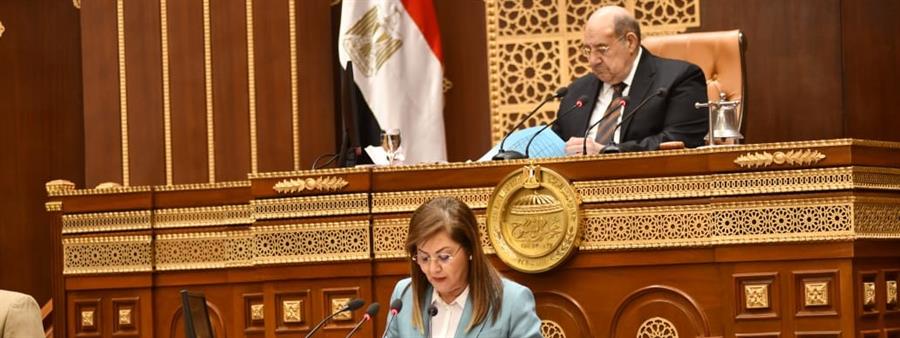Minister of Planning and Economic Development Presents Draft Economic and Social Development Plan for Fiscal Year 24/2025 to the Senate

26 May 2024
H.E.Dr. Hala El Said, Minister of Planning and Economic Development, presented the draft of the Economic and Social Development Plan for the fiscal year 24/2025 before the Senate, chaired by Counselor Abdel Wahab Abdel Razek, the President of the Senate. Also present were Dr. Ahmed Kamali, Deputy Minister of Planning and Economic Development, Dr. Jameel Helmi, Assistant Minister for Sustainable Development Plan Monitoring Affairs, Major General Mohamed El Gebali, Minister's Advisor for Political Communication, Dr. Heba Mughayb, Supervisor of Regional Planning Sector, Ismail Youssef, Supervisor of Plan Preparation and Monitoring Sector, and distinguished members of the Senate.
During the statement, Dr. Hala El Said outlined the key features of the economic and social development plan for the year 24/2025, emphasizing that efforts towards achieving sustainable development revolve around three main objectives, integrating essential dimensions and elements. These objectives include achieving sustainable economic growth, maintaining high employment levels to minimize unemployment rates, and providing comprehensive social protection for all members of society, with special emphasis on protecting low-income groups.
El Said emphasized the plan for the coming year's focus on mobilizing efforts and concentrating on projects that support these targets.
She further noted that the plan project considers supporting serious efforts and reforms continuously implemented by the state to enhance the resilience of the Egyptian economy in facing crises, seizing opportunities for overcoming them while addressing internal challenges. This includes formulating necessary governmental policies and programs to address crises, confront challenges, accelerate comprehensive and sustainable growth.
El Said highlighted the achievement of a set of priority development goals within the framework of the updated Egypt Vision 2030, expanding public expenditure on human development (health, education, and scientific research) in line with constitutional entitlements. This involves enhancing access to healthcare services, gradually expanding comprehensive health insurance to cover all governorates, continuing to improve the education system, enriching cultural and sports life, ensuring water and food security, providing safe and sustainable transportation systems, enhancing local and regional development, building digital and knowledge-based economies, and transitioning towards a green economy.
She also stressed expanding the social protection umbrella to include priority care groups, ensuring fair distribution of public investments at the local level according to the developmental equation that considers developmental gaps between governorates, in addition to implementing the second phase of the "Decent Life" initiative aimed at improving living conditions for rural families.
El Said addressed the effective continuation of implementing structural reforms adopted by the government program, prioritizing driving growth in agricultural, industrial commodity sectors, and productive services such as telecommunications and information technology, alongside sectors where Egypt holds competitive advantages, notably tourism and logistics.
She reiterated the commitment to rationalize all aspects of public spending, aiming to enhance the efficiency of public investment spending and increase its effectiveness in maximizing economic and social returns, continuing to implement program budgeting, performance standards, and cost-benefit criteria for implemented projects.
El Said also discussed the state's measures to stimulate private sector participation in investment, accelerate economic growth and employment, especially following the announcement of the state's royal policy document and the increasing trend towards stimulating private sector participation, enhancing the role of the Egyptian Sovereign Fund for Investment and Development in this field.
She further discussed the state's targeting of inflation, especially with government efforts and actions to control commodity prices in markets, expanding the provision of outlets for discounted goods, and supporting the structural reform plan focusing on real productive economic sectors.
El Said concluded by discussing the plan's outlines, which include continuing to improve employment levels, aiming to provide around 900,000 additional job opportunities in various commodity and service sectors, allowing for increased participation in economic activities and reduced unemployment rates.









